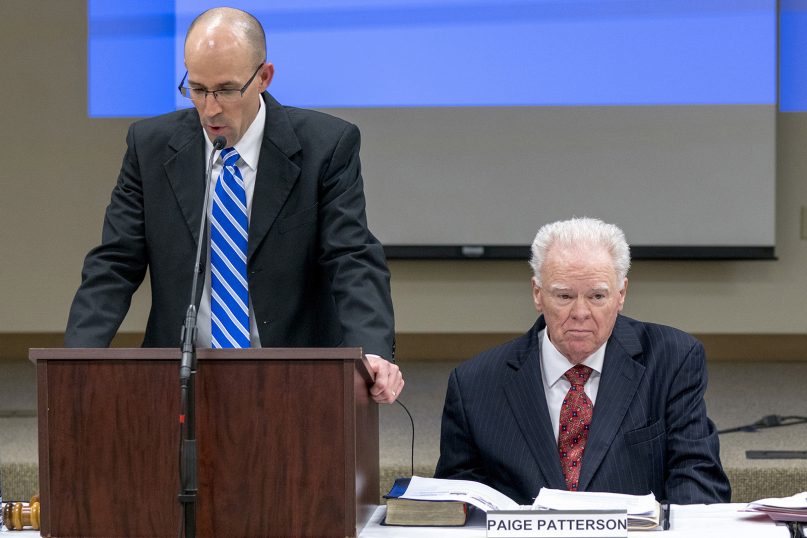(USA Today Network ) — The attorney for a Southern Baptist leader embroiled in controversy says the claims made against his client by top Texas seminary leaders are inaccurate.
Fort Worth attorney Shelby Sharpe, who is representing the recently fired Paige Patterson, issued a statement responding point-by-point to revealing comments made last week by a Southwestern Baptist Theological Seminary official.
The executive committee of the seminary’s board of trustees terminated the Southern Baptist luminary on May 30, citing his handling of allegations from students who told him they were raped. Patterson’s firing came one week after the full board opted to remove him as president of Southwestern seminary and make him president emeritus.
“Given the wide-spread misrepresentation and misinformation regarding Dr. Patterson, it is important to set the facts straight,” said Sharpe, in a Monday (June 4) statement. “The sole purpose of this release is to set forth facts and to put into perspective the committee’s decision and the way in which that decision was made.”
Sharpe is disputing claims laid out Friday in a revealing statement from Kevin Ueckert, the chairman of the seminary’s board of trustees. Ueckert’s comments came two days after the board announced Patterson’s firing in a statement that included far fewer details than what the chairman later shared.
In his statement, Ueckert said the executive committee fired Patterson for mishandling rape allegations that students shared with him. Also, a student record contradicted what Patterson had previously told a board member about a 2003 allegation from a student at Southeastern Baptist Theological Seminary in Wake Forest, N.C. Patterson was president of the North Carolina seminary at the time.
Ueckert nor other members of Southwestern’s board of trustees immediately responded to a request for comment through the seminary.
Student record, letters spur questions
Sharpe said Patterson was fired without being able to review the student record in question. Requests to see it since he was let go have been denied. At Patterson’s direction, his staff went through his personal archives and found correspondence from the student.
The letters, Sharpe says, confirm that the seminary’s dean of students, not Patterson, handled the matter. The student wrote a thank you letter to Patterson for being able to stay in school and for how the seminary handled it, he said.
“No reasonable reading of the letter suggests that the student had reported a rape to Dr. Patterson and certainly not that he ignored it,” Sharpe said.
Patterson first learned of allegations that he did not report a rape at the North Carolina seminary during the long, Southwestern board of trustees meeting on May 22, Sharpe said. Patterson was removed as president of Southwestern and made president emeritus after that board meeting ended in the early hours of May 23.
Lawyer says Patterson worried about police intimidating student
In his statement, Sharpe also disputes Ueckert’s comments about how Patterson emailed the head of the Texas seminary’s campus security after a student reported to him that she was raped in 2015. Ueckert said Patterson wrote in the email that he wanted to meet alone with the student in order to “break her down.”
Sharpe said those details are being circulated without adequate context.
He also pointed out that the full board of trustees heard his explanation of that 2015 matter during the May 22 meeting and seemed satisfied. Sharpe said Patterson does not meet alone with women without “clear accountability practices in place,” and preferred that police were not present so the young woman would not feel intimidated.
“One must wonder what transformed the explanation of his statement from satisfactory at the May 22 meeting of the full board to ‘antithetical to core values’ when considered by the executive committee May 30,” said Sharpe, referencing Ueckert’s statement.
Who owns the documents in question?
Sharpe also took issue with Ueckert’s comments on documents taken from Southeastern seminary regarding the rape allegation. He said Patterson “flatly denies” they were ever stolen. He says they are Patterson’s personal letters and do not belong to the institution, but they are willing to provide copies to Southeastern.
They have invited Southeastern seminary to work with an arbitrator to determine who owns the papers in question. Sharpe said Southeastern has not accepted.
As of Monday, Southeastern seminary had not received such a request, according to a statement from the North Carolina school.
But Southeastern argues that correspondence regarding the 2003 allegation from a student should be kept in student files protected by federal privacy laws regarding education records, the statement said. The seminary wants them back.
“SEBTS does not believe the official Presidential communications were maliciously removed from the property,” the statement said. “However, we believe there is a misunderstanding on the part of the Pattersons and their attorney as to what is owned by SEBTS under the work for hire doctrine.”
The seminary is conducting an internal review into the 2003 allegation and has been in contact with the student. The review is ongoing, but no evidence has been discovered that would dispute or discredit the student’s account, the statement said.
(Holly Meyer writes for The Tennessean. Reach her @HollyAMeyer.)





